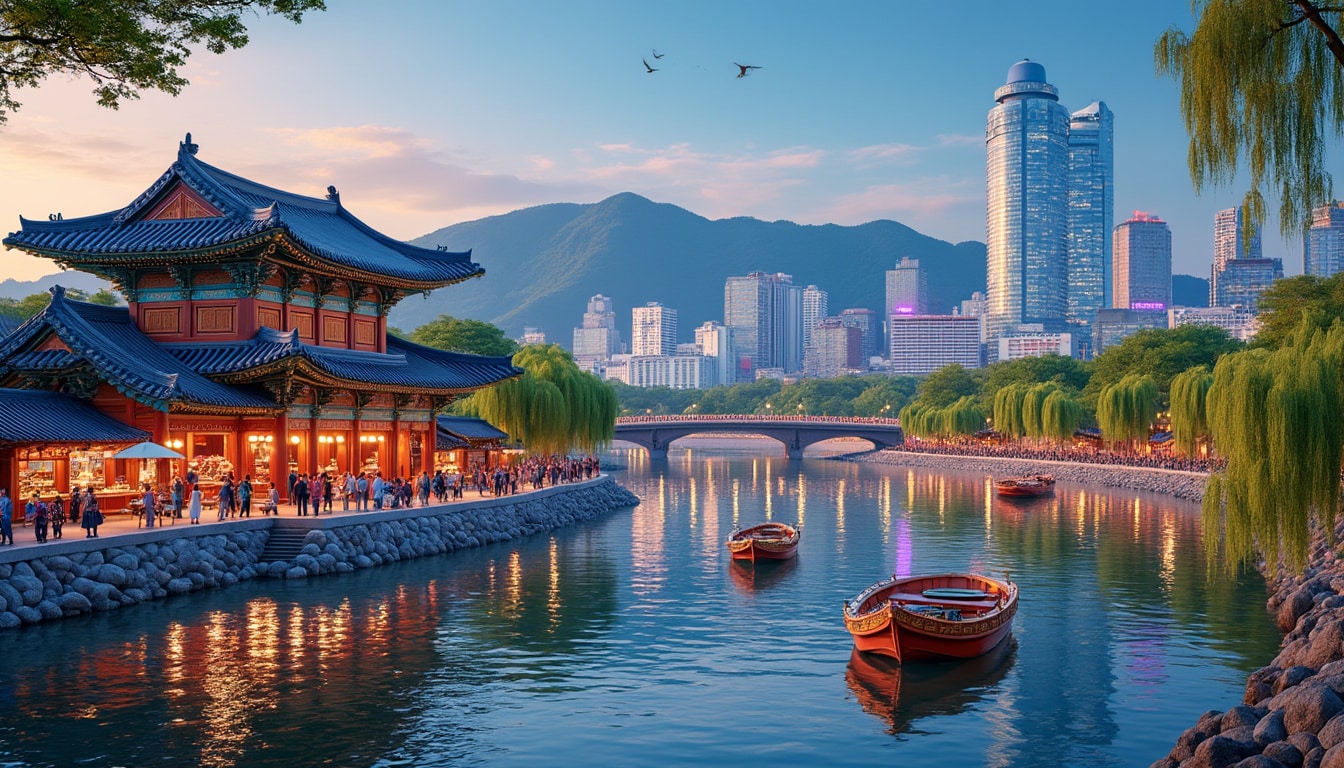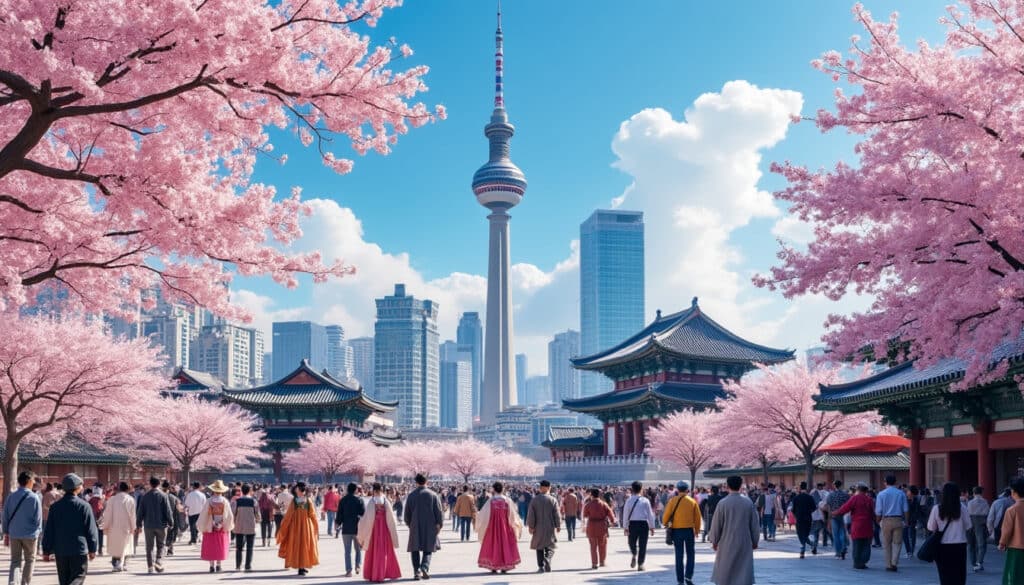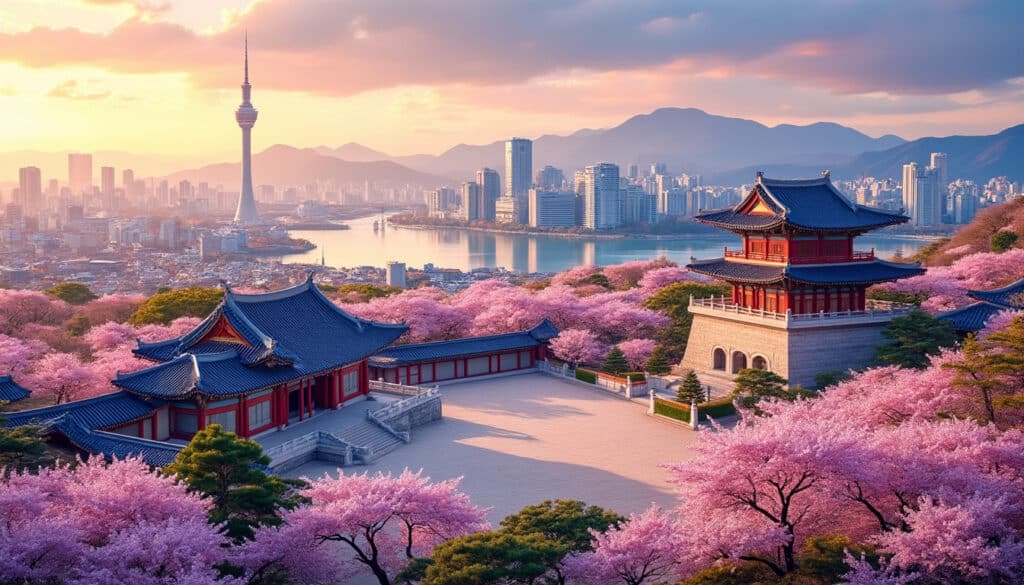Seoul, the pulsating heart of South Korea, is a city that gracefully bridges the gap between the past and the future. Known for its towering skyscrapers, neon-lit streets, and a burgeoning tech industry alongside historic palaces, tranquil temples, and bustling street markets, Seoul’s reputation and identity are firmly rooted in a unique blend of tradition and modernity. This dynamic environment has made Seoul a global hub of innovation, culture, and commerce, drawing visitors from all over the world. In this exploration, we’ll delve into Seoul’s urban characteristics, its global cultural influence, how it balances tradition with modernity, and what makes it an attractive destination for living, working, and traveling.
The Influential Cultural Identity of Seoul
Seoul’s cultural identity is one of the most defining aspects of its reputation on the global stage. The city is often recognized for its significant contribution to the spread of K-pop, which has become a global sensation. Groups like BTS and Blackpink have transformed Seoul into a pilgrimage site for millions of fans, contributing to the city’s vibrant cultural atmosphere. Besides music, Seoul is renowned for its commitment to art and fashion, with events like Seoul Fashion Week showcasing both local talent and international designers.
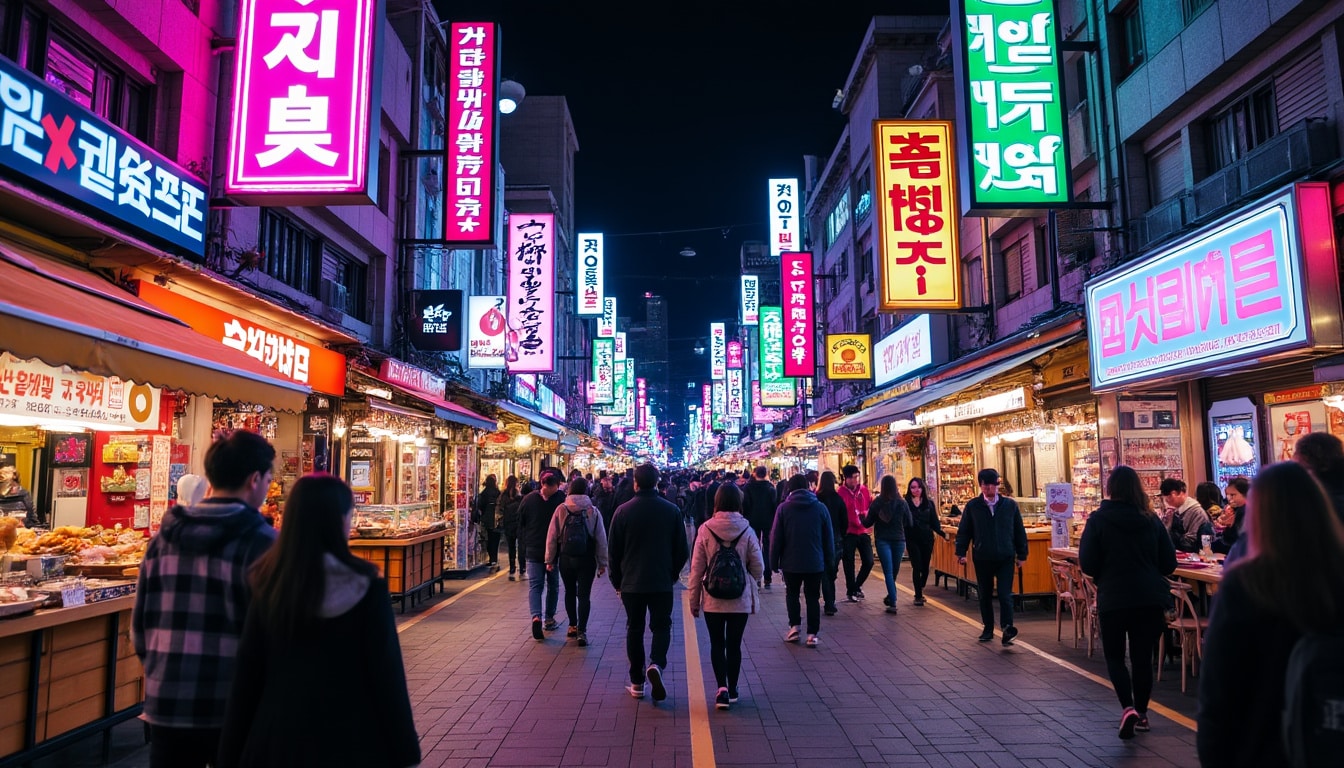
Seoul’s cultural landscape is further enriched by its world-class museums and galleries. Institutions such as the National Museum of Korea and the Leeum, Samsung Museum of Art present an impressive array of both traditional and contemporary pieces, offering a window into the country’s rich history and its modern artistic inclinations. For those interested in traditional Korean culture, the city offers historical sites like Gyeongbokgung Palace and the Bukchon Hanok Village, where visitors can immerse themselves in the Seoul of yesteryear.
Traditional Festivals and events amplify the cultural experience. Major holidays, like Chuseok and Seollal, are celebrated with traditional customs and food, providing a unique opportunity for visitors to engage with the local heritage. Additionally, these events serve as a platform for sharing Korean culture with the world, further cementing Seoul’s role as a cultural capital.
Seoul’s identity is also closely tied to its culinary scene. The city boasts a diverse range of dining experiences, from high-end Michelin-starred restaurants to street food vendors offering dishes like tteokbokki and hotteok that delight both locals and tourists alike. This culinary diversity is enhanced by the influence of international flavors, creating a gastronomic wonderland that reflects the city’s multiculturalism.
Moreover, Seoul’s reputation as a tech-savvy city enhances its cultural identity. With tech giants like Samsung and LG Electronics based in Seoul, the city is at the forefront of technological advancements, which are seamlessly integrated into everyday life. From the lightning-fast internet to the widespread adoption of smart technology, Seoul exemplifies a technologically woven society, making it a fascinating place for tech enthusiasts and innovators.
The Role of Media in Shaping Seoul’s Identity
The global media plays a pivotal role in shaping Seoul’s identity. Korean dramas, often referred to as K-dramas, have captivated audiences globally, showcasing Seoul’s landmarks and lifestyle to a worldwide audience. Platforms like Netflix have made these dramas accessible to an even broader audience, portraying Seoul as a city of endless possibilities and narratives.
- 🎶 K-pop’s Influence: Global concerts and events connect fans worldwide to Seoul.
- 🎨 Art and Museums: Blending the past and present with exhibitions and galleries.
- 🍜 Gastronomy: A blend of traditional and international culinary experiences.
Seoul’s cultural exports not only boost its reputation but also create an intriguing identity that resonates with young, ambitious, and culturally curious demographics worldwide. As Seoul continues to push its creative boundaries, its reputation as a vibrant cultural hub is set to grow even more exciting in the future.
Seoul’s Urban Landscape: A Fusion of Old and New
Seoul is a city where the skyline is continually evolving, with every new building and urban design adding a layer to its complex landscape. This evolution is not haphazard but rather a carefully crafted blend of old and new that reflects the city’s historical depth and its forward-thinking nature. The urban design hotspots like Gangnam stand out for their high-rises, representing Seoul’s economic prosperity and modernity.
One of Seoul’s most intriguing features is how its urban landscape balances sacred historical sites with cutting-edge modern architecture. Areas such as Jongno and Insadong draw visitors with their ancient temples and traditional Hanok houses, offering a glimpse into Korea’s past. In contrast, districts like Dongdaemun and Namdaemun are celebrated for their blend of historic markets and the futuristic Dongdaemun Design Plaza.
Architectural Diversity
The architectural diversity in Seoul is astounding. The city’s skyline features iconic skyscrapers like Lotte World Tower juxtaposed with traditional low-rise buildings. This juxtaposition creates a distinctive environment where different architectural eras coexist, offering a tangible reflection of Seoul’s adaptability and breadth.
| Architectural Highlights | Location | Significance |
|---|---|---|
| Lotte World Tower | Songpa-gu | Tallest building in South Korea |
| Gyeongbokgung Palace | Jongno-gu | Symbolizes royal history and traditional architecture |
| Dongdaemun Design Plaza | Jung-gu | Icon of modern architecture and design |
Seoul’s urban planning has received praise for its innovative approaches that incorporate green spaces into urban living. Locations such as the Cheonggyecheon Stream and Hangang Park have rejuvenated parts of the city, making them idyllic getaways amidst the hustle and bustle. These urban green spaces contribute to Seoul’s allure as a city that values both its heritage and its environment.
In line with its modern identity, Seoul also embraces smart technology in its urban planning efforts. This is seen in the city’s efficient transport networks, like the Seoul Metro, renowned for its punctuality and reach. The integration of cutting-edge technologies, AI, and IoT into city infrastructure reflects Seoul’s commitment to becoming a leading global smart city.
Challenges in Urban Development
However, Seoul’s rapid urban development does come with its challenges. The need to preserve cultural landmarks while accommodating a growing population has led to intricate urban planning initiatives. The city’s approach to development must carefully balance preservation with innovation to maintain its unique character.
- 🏙️ Integration of Green Spaces: Cheonggyecheon Stream as a model of urban renewal.
- 🕌 Preserving Cultural Heritage: Balancing modernization with tradition.
- 🚇 Efficient Transportation: Expansive metro systems integrating technology for sustainable travel.
The interplay between Seoul’s architectural magnificence and its dedication to sustainability underscores the city’s dynamic character, making it a compelling destination for architects, urban planners, and tourists alike.
Seoul’s Economic Force and Global Brand
As the capital of South Korea, Seoul serves as the country’s economic powerhouse and a key player in the global market. Industries like electronics, automotive, and telecommunications spearheaded by giants such as Samsung, Hyundai, and SK Telecom respectively, are centered in Seoul, showcasing the city’s strategic importance. Additionally, companies like Korean Air and CJ Group contribute significantly to the business ecosystem, making Seoul an attractive hub for international business.
Seoul’s Competitive Edge
The Global Financial Centres Index places Seoul among the top cities globally, recognizing its robust economic infrastructure. Despite the intense competition from global cities, Seoul maintains a competitive edge in areas such as human capital and infrastructure development. Initiatives in innovation and technology are critical factors that have propelled Seoul into becoming one of the leading tech and innovation hubs worldwide.
- 💼 Major Industries: Electronics, automotive, and telecommunications.
- 💡 Innovation: Leading in tech innovation and development.
- 🏢 International Business: Attracting global business investments.
| Industry | Leading Company | Global Influence |
|---|---|---|
| Electronics | Samsung, LG Electronics | Innovation in technology and consumer electronics |
| Automotive | Hyundai | Global automotive innovation and production |
| Telecommunications | SK Telecom | Leading advancements in telecommunication technologies |
Apart from being a commercial hub, Seoul is also famous for developing strategic partnerships and hosting global events that strengthen its international presence. From hosting business expositions to being a thriving center for diplomatic activities, Seoul continually demonstrates its importance in the global arena.
Brand and Reputation
Seoul’s brand is reinforced by its image as a city of innovation and culture. Events such as Seoul Fashion Week attract global attention, establishing it as a trendsetter in fashion. Additionally, Seoul is home to many influential research institutes and universities, further solidifying its reputation as a center of learning and innovation.
- 📰 Global Events: Hosting international forums and expositions.
- 🎓 Educational Institutions: Renowned universities attracting global talent.
- 👗 Fashion Influence: A leader in global fashion and design trends.
The blend of economic strength, cultural heritage, and modern innovation makes Seoul a unique player on the world stage, continuously attracting business investments and skilled workforce from around the globe.
Seoul’s Livability and Sustainability
Seoul’s reputation doesn’t just rest on its economic or cultural prowess; it is also known for its high standard of living. The city offers a diverse range of experiences for both residents and visitors, making it an appealing place to live, work, and study. Over the years, Seoul has worked on enhancing the quality of its urban life, focusing on sustainability and livability to address the challenges of rapid urbanization.
Quality of Life in Seoul
The city is consistently ranked high in global quality of life indices, thanks to factors like excellent health care, education, and public services. Seoul’s efforts to improve the urban experience include the development of spacious parks, cultural districts, and efficient public transportation networks. These initiatives not only enhance the quality of life but also ensure that the city’s growth remains sustainable in the long term.
- 🌿 Sustainability Initiatives: Emphasis on green infrastructure and public spaces.
- 🚴 Transportation: Comprehensive metro and bus systems for convenient commuting.
- 🏥 Healthcare: Accessible and high-quality healthcare facilities.
| Aspect | Ranking | Highlights |
|---|---|---|
| Sustainability | Top 30 Globally | Energy efficiency and eco-friendly initiatives |
| Public Transport | Top 10 Globally | Extensive metro and bus network |
| Healthcare | Top 20 Globally | High-quality medical services and infrastructure |
Seoul’s rising focus on sustainability is evident in initiatives targeting reduced emissions, energy conservation, and minimization of its carbon footprint. Programs promoting cleaner air and water quality are significant steps towards maintaining livability as the city continues to grow and attract residents.
The Future of Living in Seoul
Seoul’s forward-thinking policies aim to enhance urban living standards continually. The city’s investment in smart technology, including smart homes and intelligent transport systems, plays a major role in this vision. Partnerships with tech companies like Naver and Kakao are pivotal in developing services that improve life quality for residents, from smarter city services to advanced healthcare options.
- 🔋 Smart City Initiatives: Collaborations with tech companies to enhance urban life.
- 🏘️ Residential Development: Focus on sustainable and smart housing solutions.
- 📈 Public Services: Improving service delivery through technology.
As Seoul continues to implement these innovations, it exemplifies a blend of tradition and modernity, sustaining its reputation as not just a place to visit but a desirable city to call home.
FAQs about Seoul’s Identity and Reputation
Here are some frequently asked questions about the reputation and identity of Seoul:
Q: What are some of the main attractions in Seoul?
A: Major attractions include Gyeongbokgung Palace, N Seoul Tower, Bukchon Hanok Village, and the vibrant districts of Hongdae and Itaewon.
Q: How does Seoul blend tradition and modernity?
A: Seoul combines traditional sites like the palaces with modern architecture and tech-driven urban planning, highlighting this balance in areas like Jongno and Gangnam.
Q: What makes Seoul a business hub?
A: Seoul is a business hub due to its strategic location, advanced infrastructure, and presence of global giants like Samsung and Hyundai.
Q: What are some cultural events to experience in Seoul?
A: Events like Seoul Fashion Week, Chuseok celebrations, and the Seoul Lantern Festival offer rich cultural experiences.
Q: What efforts has Seoul made towards sustainability?
A: Seoul has implemented sustainability initiatives focused on green spaces, public transportation, and smart city technologies to enhance livability.
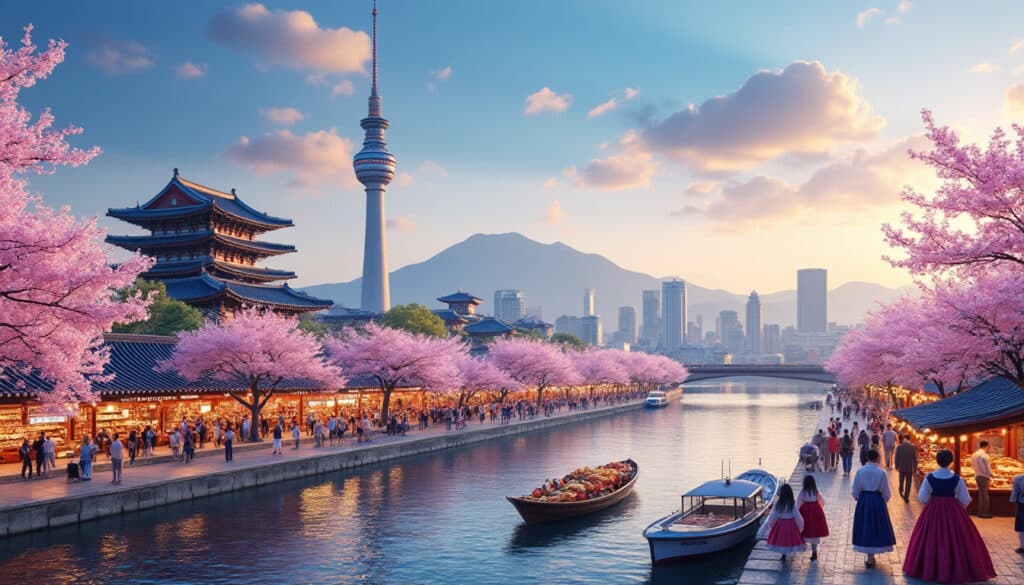
Fun Facts & Curiosities About Seoul
Seoul, a dazzling fusion of modernity and tradition, captivates every visitor with its vibrant blend of history, culture, and innovation. From being a technological metropolis to a cultural capital, the city offers a myriad of interesting facets waiting to be…
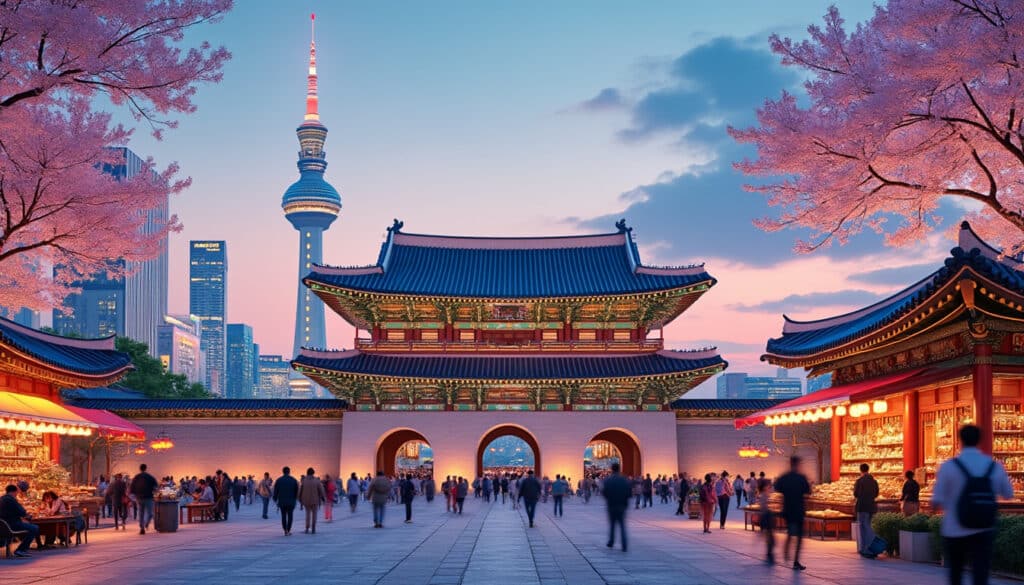
Architecture and urban features of Seoul
Seoul, South Korea’s vibrant capital, stands as a dynamic fusion of traditional culture and modern innovation. The city’s architectural wonders are a testament to its rich history and cutting-edge design principles, weaving a tapestry where ancient palaces coexist with towering…
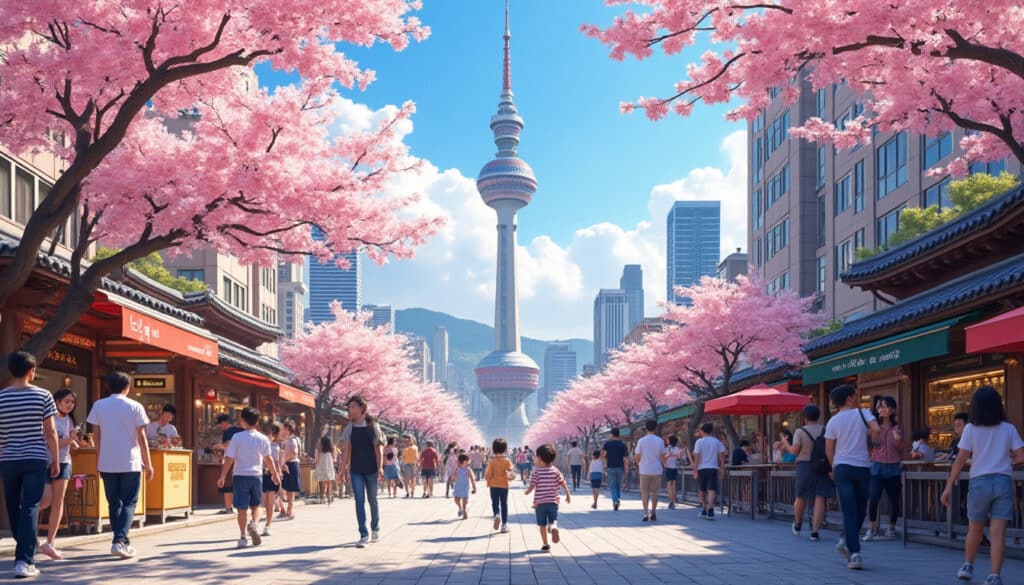
Seoul is a bustling metropolis where the ancient and modern coexist harmoniously. From its rich history rooted in time-honored traditions to its vibrant nightlife and technological advancements, this city is a haven for both tourists and expats. Stepping into Seoul…
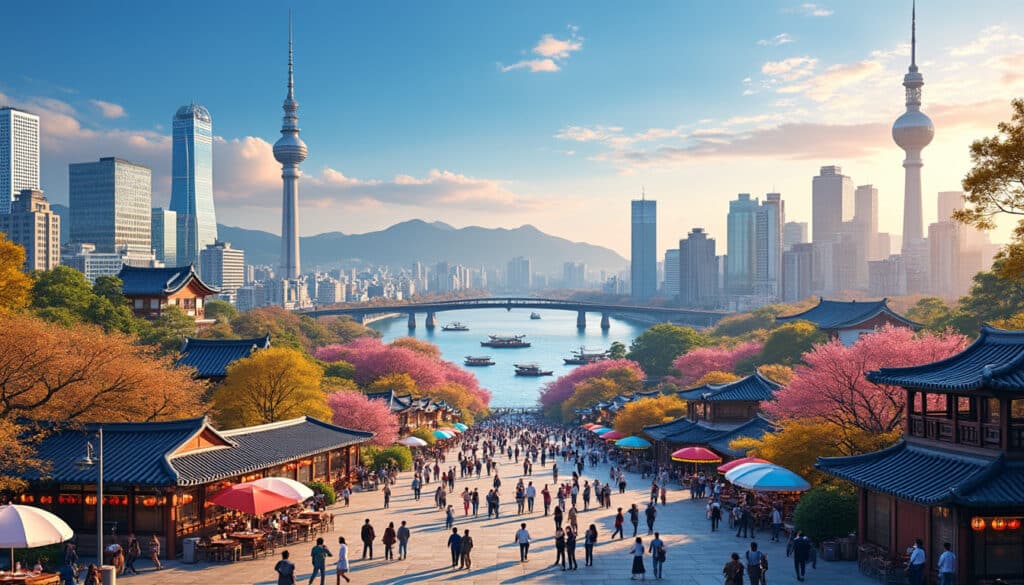
Demographics and geography of Seoul
Seoul, the vibrant capital of South Korea, stands as a testament to the country’s rapid development and cultural evolution. Nestled along the banks of the Han River in the northwestern corridor of the Penninsula, Seoul represents a harmonious blend of…
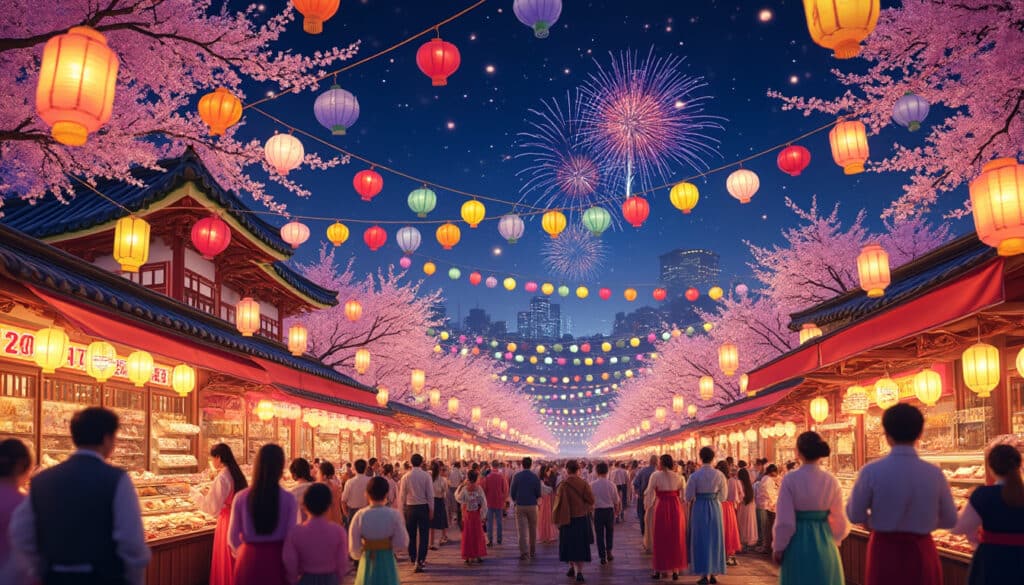
Holidays and celebrations in Seoul
Seoul, the heart of South Korea, is where traditions meet modernity, creating a unique tapestry of cultural and contemporary celebrations. The city, known for its vibrant lifestyle and rich history, transforms into a festive wonderland during public holidays. From historical…
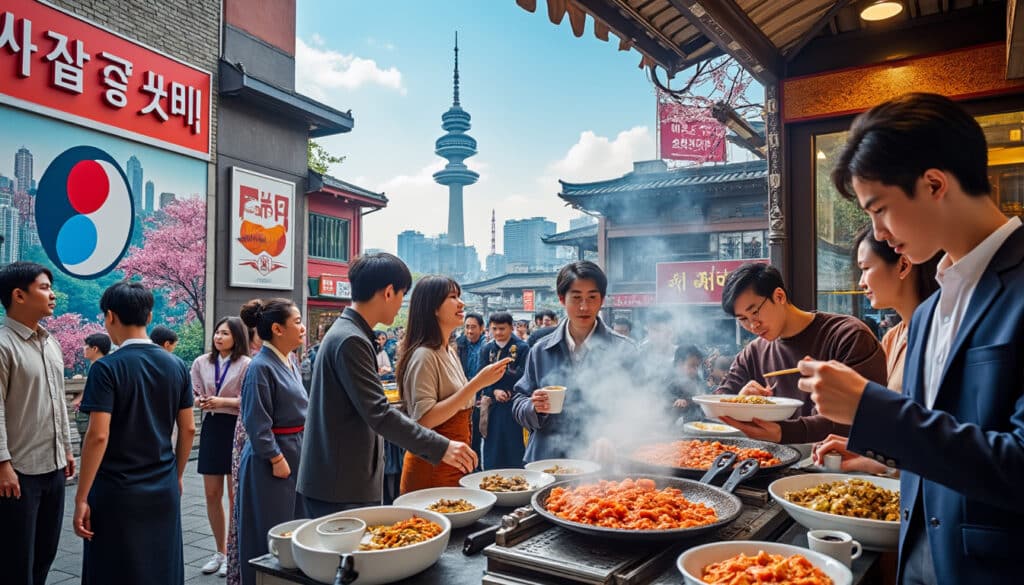
Language and spelling of Seoul
Seoul, the bustling capital city of South Korea, is not just a hub of rapid technological advancements and modern culture, but also a treasure trove of linguistic history and evolution. The city’s language and spelling conventions offer a window into…
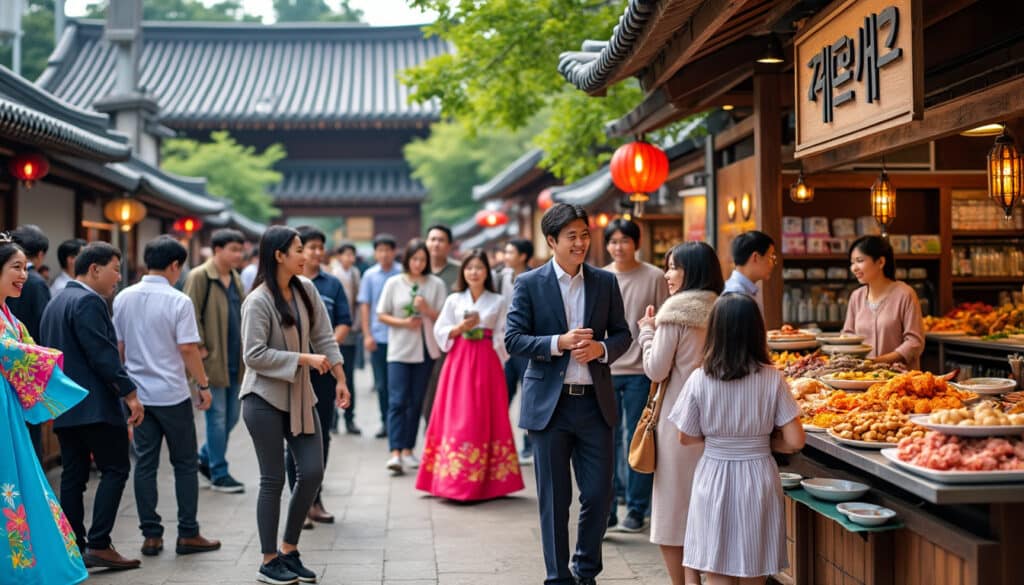
Local tips for tourists in Seoul
Seoul, the vibrant capital of South Korea, offers a fusion of ultra-modern skyscrapers and ancient palaces, bustling markets, and serene temples. However, while embarking on a journey to this dynamic metropolis, tourists often miss the oddly charming, unconventional spots that…
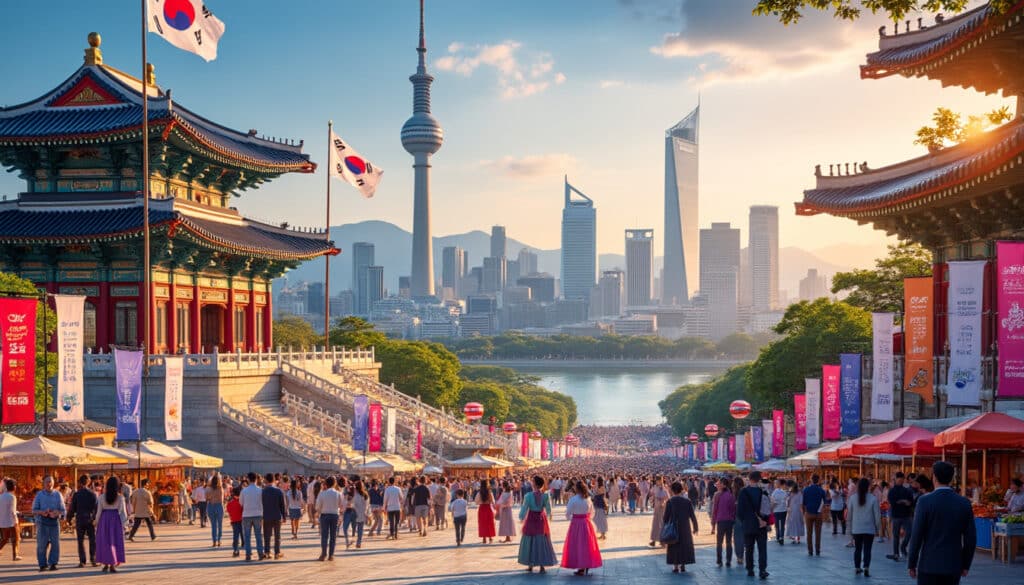
Names, flags, and identity of Seoul
Seoul, a dazzling city that serves as the heart of South Korea, has more to offer than its bustling streets, futuristic skyscrapers, and vibrant culture. Its essence is interwoven with the intriguing tapestry of its names, symbols, and identity. The…
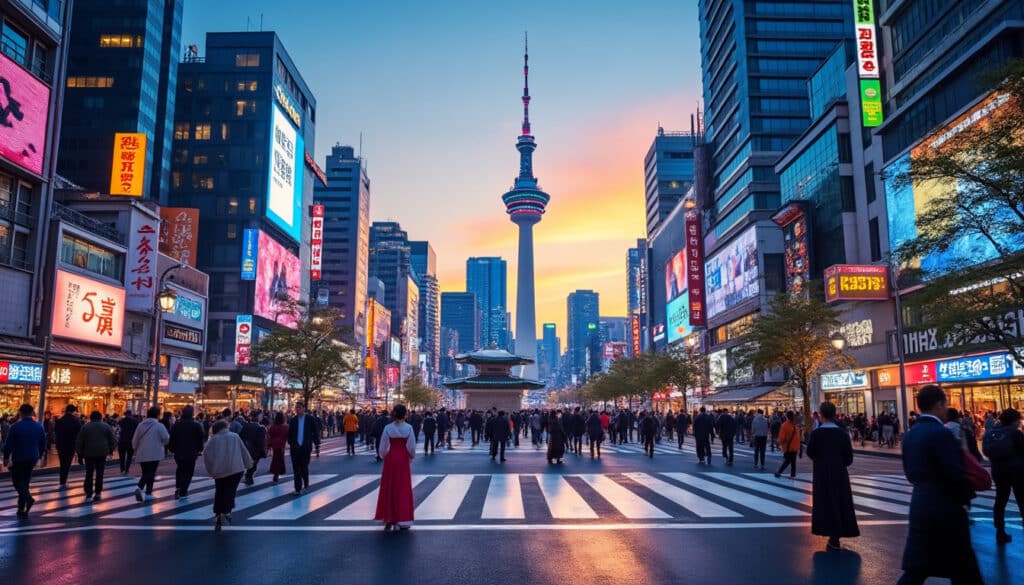
Seoul, a sprawling city that seldom sleeps, is a vibrant blend of tradition and modernity, pulsing with energy around the clock. Understanding time in this bustling metropolis is crucial for both residents and visitors, not only for practical planning but…
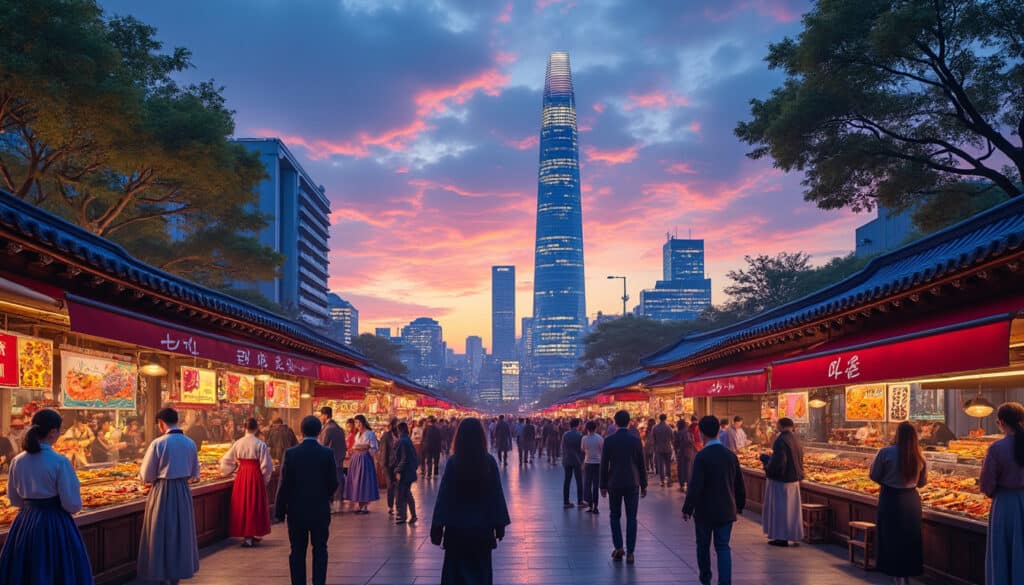
Unusual facts and social issues in Seoul
Seoul, a dazzling tapestry of ancient history and contemporary vibrance, offers explorers an eclectic mix of the unexpected and the familiar. As a hub of innovation with deep cultural roots, Seoul embodies a fascinating blend of contrasts that draw millions…
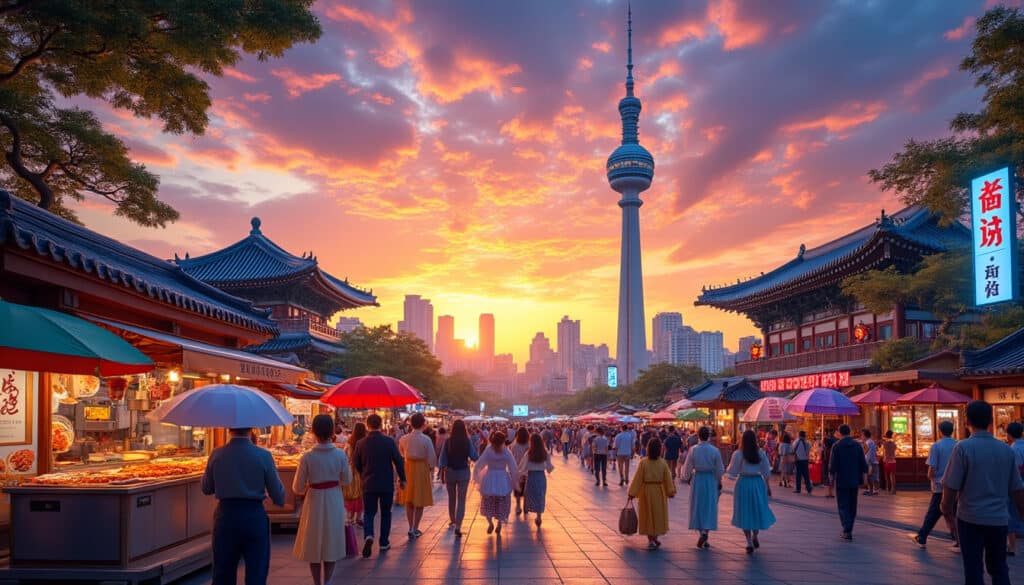
What does Seoul look, smell, feel like?
Seoul, South Korea’s sprawling metropolis, is a city that engages all the senses. As you navigate its bustling streets, you’re enveloped by a panorama of contrasting elements: sleek skyscrapers shoot up next to ancient palaces, neon-lit alleyways buzz with life…

